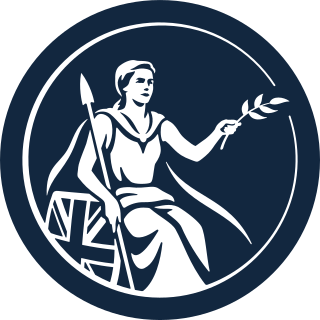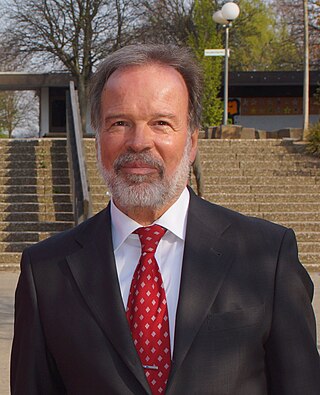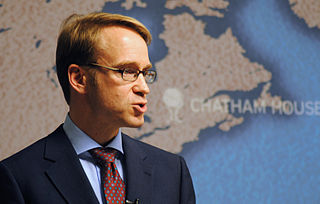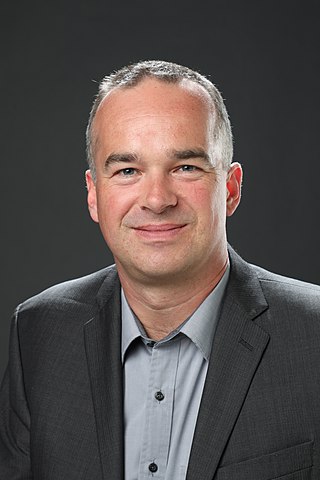Related Research Articles
The Austrian School is a heterodox school of economic thought that advocates strict adherence to methodological individualism, the concept that social phenomena result exclusively from the motivations and actions of individuals. Austrian school theorists hold that economic theory should be exclusively derived from basic principles of human action.

The Bank of England is the central bank of the United Kingdom and the model on which most modern central banks have been based. Established in 1694 to act as the English Government's banker, and still one of the bankers for the Government of the United Kingdom, it is the world's eighth-oldest bank. It was privately owned by stockholders from its foundation in 1694 until it was nationalised in 1946 by the Attlee ministry.

The euro area, commonly called the eurozone (EZ), is a currency union of 20 member states of the European Union (EU) that have adopted the euro (€) as their primary currency and sole legal tender, and have thus fully implemented EMU policies.

Steve H. Hanke is an American economist and professor of applied economics at the Johns Hopkins University in Baltimore, Maryland. He is also a senior fellow at the Independent Institute in Oakland, California, and co-director of the Johns Hopkins University's Institute for Applied Economics, Global Health, and the Study of Business Enterprise in Baltimore, Maryland.
The Austrian business cycle theory (ABCT) is an economic theory developed by the Austrian School of economics about how business cycles occur. The theory views business cycles as the consequence of excessive growth in bank credit due to artificially low interest rates set by a central bank or fractional reserve banks. The Austrian business cycle theory originated in the work of Austrian School economists Ludwig von Mises and Friedrich Hayek. Hayek won the Nobel Prize in Economics in 1974 in part for his work on this theory.

Axel Alfred Weber is a German economist, professor, and banker. He is currently a board member and chairman of Swiss investment bank and financial services company, UBS Group AG, and has announced his resignation effective 7 April 2022.

Peter Bofinger is a German economist and a former member of the German Council of Economic Experts.

Norbert Walter was a German economist. He was the chief economist of Deutsche Bank from 1990 to 2009.
Jan Hatzius is the chief economist of investment bank Goldman Sachs. Notable for his bearish forecasts prior to the Financial crisis of 2007–2008, he is a two-time winner of the Lawrence R. Klein Award for the most accurate US economic forecast over the prior four years. He has also won a number of other forecasting awards, including the Wall Street Journal, Bloomberg, and Institutional Investor annual forecaster rankings.

The European debt crisis, often also referred to as the eurozone crisis or the European sovereign debt crisis, was a multi-year debt crisis that took place in the European Union (EU) from 2009 until the mid to late 2010s. Several eurozone member states were unable to repay or refinance their government debt or to bail out over-indebted banks under their national supervision without the assistance of third parties like other eurozone countries, the European Central Bank (ECB), or the International Monetary Fund (IMF).

Jens Weidmann is a German economist who served as president of the Deutsche Bundesbank between 2011 and 2021. He also served as chairman of the Board of the Bank for International Settlements.
In the United States, the Great Recession was a severe financial crisis combined with a deep recession. While the recession officially lasted from December 2007 to June 2009, it took many years for the economy to recover to pre-crisis levels of employment and output. This slow recovery was due in part to households and financial institutions paying off debts accumulated in the years preceding the crisis along with restrained government spending following initial stimulus efforts. It followed the bursting of the housing bubble, the housing market correction and subprime mortgage crisis.

Jörg Asmussen is a German economist and banker has been serving as Chief Executive Officer of the German Insurance Association (GDV) since 2020.
Claudia Maria Buch is a German economist who currently serves as Vice President of the Bundesbank. She previously worked as professor at the University of Tübingen and served as a member of the German Council of Economic Experts. Buch worked as scientific director at the Institut für Angewandte Wirtschaftsforschung in Tübingen and as chairperson of the economic council at the Federal Ministry of Economics and Technology. She still teaches at the Otto-von-Guericke-Universität Magdeburg. Her research focuses on regulation and supervision of banking.

Lars Peter Feld is a German economist who currently serves as director of the Walter Eucken Institut and as Professor for Economic Policy at the University of Freiburg. From 2020 to 2021 he also chaired the German Council of Economic Experts. Federal Minister of Finance Christian Lindner made Feld his personal economic policy advisor in February 2022.

Isabel Schnabel is a German economist who has been serving as a member of the Executive Board of the European Central Bank since 2020.
David Folkerts-Landau is a German born economist. He became member of the Deutsche Bank Group Executive Committee in 2012 and was named chief economist of Deutsche Bank on 1 June 2012. He is based in London.

Jakob von Weizsäcker is a German economist and politician of the Social Democratic Party (SPD) who has been serving as State Minister of Finance in the government of Minister-President of the Saarland Anke Rehlinger since the 2022 state elections.

Christian Catalini is a co-creator of Diem, the Chief Economist of the Diem Association, and the Theodore T. Miller Professor at the MIT Sloan School of Management.

Rüdiger Fahlenbrach is a German economist specialised in finance. He is a professor of finance at EPFL and holds the Swiss Finance Institute Senior Research Chair.
References
- ↑ "Deutsche Bank chief economist Thomas Mayer becomes Senior Advisor to the Bank". Deutsche Bank. 13 April 2012.
- ↑ "Center for Financial Studies : Thomas Mayer". Archived from the original on 2014-04-09. Retrieved 2014-04-09.
- ↑ "Deutsche Bank's Thomas Mayer Succeeds Walter as Chief Economist". Bloomberg. November 26, 2009.